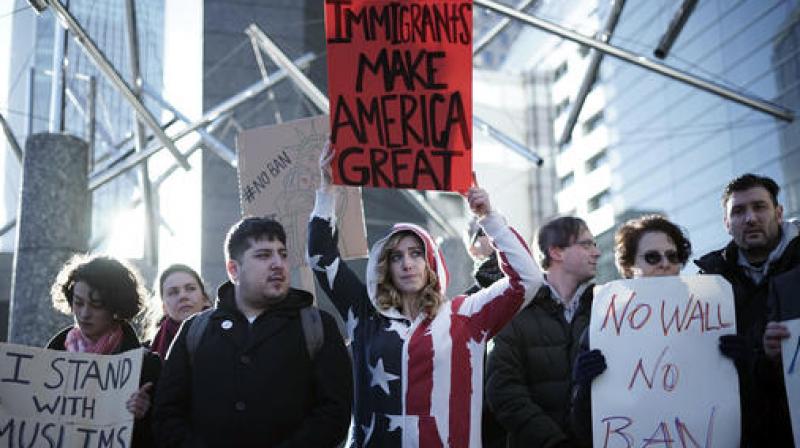From doctor to US military cook, Trump ban upends many lives

Los Angeles: A doctor who saved Syrian lives and a man who cooked thousands of meals for American soldiers in Iraq were among those who saw their lives thrown into limbo when President Donald Trump's executive order barred travellers from seven Muslim countries from entering the US.
In some instances the order separated mothers from young children and husbands from wives as people with valid entry visas were stranded in countries around the world.
"I was shocked. She has a visa and they're telling her she can't go," Ahmed Ali said by phone on Monday from a hotel in the African country of Djibouti after authorities refused to let his 12-year-old daughter, Eman, board a plane with him to the United States.
Ali, his wife and their two older children are U.S. citizens but Eman was born in Yemen and has been living there with her grandparents.
The 38-year-old grocery store manager from Los Banos, California, said he spent five years trying to get Eman a visa and finally obtained one on Thursday. By Saturday, when they tried to leave, it had been invalidated and he said he wasn't sure what he'd do next. Meanwhile, he's worried that if he doesn't return home soon he could lose his job.
"It is racist," he said of Trump's order. "We are being targeted for our nationality and religion."
Also barred from returning is Khaled Almilaji, a Syrian doctor who has been attending Brown University in Providence, Rhode Island, on a scholarship while he studies ways to rebuild his country's health system. He said that his pregnant wife remains in the United States while he is in Turkey.
"It is really sad where the world is going to," said Almilaji, who risked his life to provide medical care during Syria's civil war and coordinated a campaign that vaccinated 1.4 million Syrian children.
Trump denied the order was to blame for chaos at the nation's airports where hundreds of legal residents with green cards were stopped and interrogated for hours over the weekend while many with valid entry visas were simply turned away.
Instead Trump blamed computer glitches and the large airport protests his order prompted as he took to Twitter to argue it was needed because there are "a lot of 'dudes' out there."
The president issued a 90-day ban on travelers from Iraq, Syria, Iran, Sudan, Libya, Somalia and Yemen. He also suspended the admission of all refugees for 120 days and indefinitely barred refugees from Syria.
Although thousands protested the order at airports around the country and civil rights groups and some members of Congress denounced it, Trump supporters say it is a needed safeguard.
"We need to know who these people are," said retired firefighter Charles Lewis of Topeka, Kansas. "I just don't think this nation is secure. We're a day late and a dollar short on everything."
One of the many the order barred is Luey Rabban, who works 16-hour days as cook in a Baghdad restaurant and who received refugee status in the United States about eight months ago. He was waiting for his turn to emigrate but said Monday he is unsure now if that day will ever come.
"I just want to come and see my family," Rabban, 47, said by phone from Baghdad through an Arabic translator at his brother's home in El Cajon, California, a suburb east of San Diego that has been a magnet for Iraqi Christians fleeing violence and, more recently, for Syrian refugees.
Rabban, who served meals to the U.S. military at the Baghdad airport from 2003 to 2011, said a U.S. Army officer helped him start on his refugee application six years ago.
Syrian brothers Bassam and Hassan Abouasali waited for 13 years to have their visas approved so they could join their brother, a U.S citizen, in Allentown, Pennsylvania, where he has a house waiting for them.
They finally got the visas last year but decided to spend one last Christmas in Damascus before leaving.
When they arrived at Philadelphia International Airport with their wives and children on Saturday they learned their visas had been canceled and they were sent back.
"They're exhausted. They're angry. They're frustrated. They're afraid," said their sister-in-law Sarmad Assali, a naturalized citizen who came to the United States when she was 13. "They don't know what they have done wrong to be treated that way."

